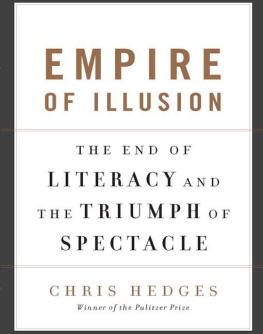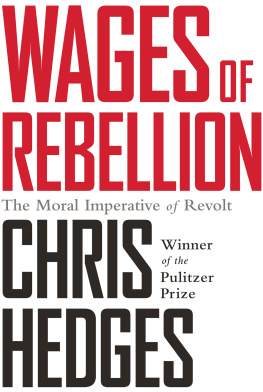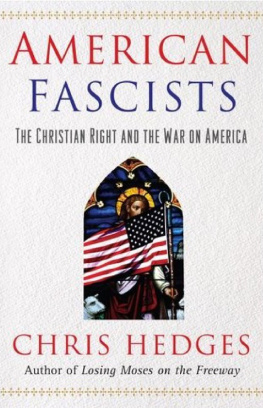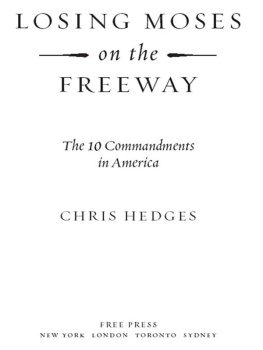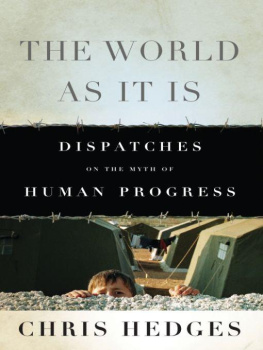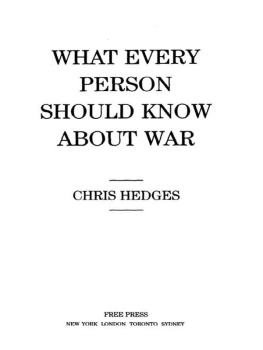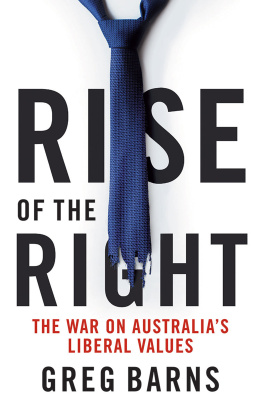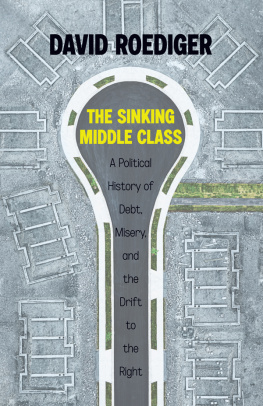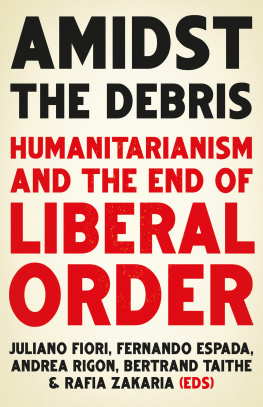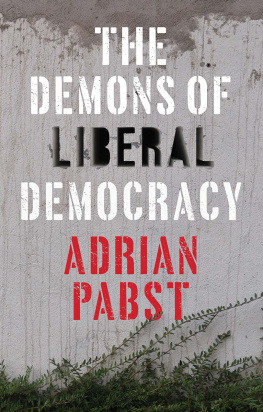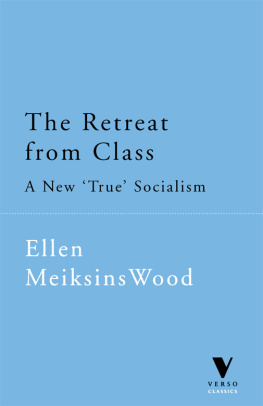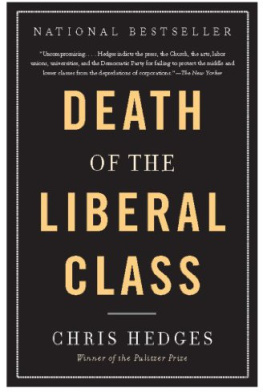Table of Contents
For Eunice, Tu mihi cvrarvm reqvies, tv nocte vel atra Ivmen, et in solis tv mihi tvrba locis.
At any given moment there is an orthodoxy, a body of ideas which it is assumed that all right-thinking people will accept without question. It is not exactly forbidden to say this, that or the other, but it is "not done" to say it, just as in mid-Victorian times it was "not done"to mention trousers in the presence of a lady. Anyone who challenges the prevailing orthodoxy finds himself silenced with surprising effectiveness. A genuinely unfashionable opinion is almost never given a fair hearing, either in the popular press or in the highbrow periodicals.
GEORGE ORWELL, "Freedom of the Press"
Resistance
To allow the market mechanism to be sole director of the fate of human beings and their natural environment, indeed, even of the amount and use of purchasing power, would result in the demolition of society. For the alleged commodity "labor power cannot be shoved about, used indiscriminately or even left unused, without affecting the human individual who happens to be the bearer of this peculiar commodity. In disposing of a man's labor power the system would, incidentally, dispose of the physical, psychological, and moral entity of "man" attached to the tag. Robbed of the protective covering of cultural institutions, human beings would perish from the effects of social exposure; they would die as the victims of acute social dislocation through vice, perversion, crime, and starvation. Nature would be reduced to its elements, neighborhoods and landscapes defiled, rivers polluted, military safety jeopardized, the power to produce food and raw material destroyed.
KARL POLANYI, The Great Transformation
ERNEST LOGAN BELL, an unemployed twenty-five-year-old Marine Corps veteran, walks along Route 12 in Upstate New York. A large American flag is strapped to the side of his green backpack. There is a light drizzle and he is wearing a green Army poncho. Short, muscular, and affable, with his brown hair in a close military crop, Bell tells me when I stop my car that he is on a six-day, ninety-mile, self-styled "Liberty Walk" from Binghamton to Utica. He plans to mount a quixotic campaign to challenge Democratic incumbent Rep. Michael Arcuri in the 24th Congressional District as the Republican candidate. Bell has camped out along the road for three nights and stayed in cheap motels the other nights. He opposes the health-care bill recently passed by the Democratic-majority Congress, calls for an end to the wars in Iraq and Afghanistan, advocates the abolishment of the Federal Reserve, is against the Federal Government's Wall Street bailouts, and wants to see immediate government relief for workers, including himself, trapped in prolonged unemployment. He carries a handwritten sign: "End the Fed," echoing the title of a book by U.S. Representative Ron Paul he keeps in his backpack, along with a copy of U.S. Constitution for Dummies by Michael Arnheim. He says he plans to deliver Paul's book to Arcuri's office in Utica.
I just walked through the town of Norwich," he says as a car passes and the driver honks in support, "and there is a strong Tea Party movement there."
The Tea Party movement, for the most part, is just a bunch of disgruntled Americans. They know something is wrong and they are ready to be engaged. A lot of the people in my area who are in the Tea Party are Democrats. People are confused. They are shell-shocked. They don't know what to think. But acting like these problems started January 20 [the date of the presidential inauguration] is absurd. To single out the current president and not the presidents before him is not productive for trying to figure out what is going on.
Bell, who lives in Lansing, New York, is the new face of resistance. He is young, at home in the culture of the military, deeply suspicious of the Federal Government, dismissive of the liberal class, unable to find work, and angry. He swings between right-wing and left-wing populism, expressing admiration for both Paul and U.S. Representative Dennis Kucinich, as well as the Tea Party movement. He started out as a supporter of John McCain in the last presidential election but soured on the Arizona senator and the Republican Party's ties to Wall Street. He ended up not voting in that election. He has raised about $1,000 from neighbors and friends for his own campaign. Adept at martial arts, he made it to the semifinals of the 2010 Army National Guard Combative Championship at Fort Benning in Georgia, where, in his last bout, he suffered a broken nose, bruised his opponent's ribs and thighs, and lost in a split decision.
I am truly terrified when I think about our future," he says: I believe all signs point to a real systemic economic collapse in the near future, maybe even before the midterm elections. I believe this is why many incumbents are stepping down. They seem to know what is coming and of course the rats are jumping ship and taking their pensions with them. There will be nothing the government or the Fed can do to slow the pain, no more tricks in the bag. I assure you it's going to hurt everyone, except of course, the corporate and banking elite. I say let the empire collapse; sometimes we must die to be reborn. The political system as it stands offers little hope for influencing real change or social justice. I propose we attempt to reverse this coup d'tat by attempting a coup of our own. First, we must try to retake the traditional means of control, power and discourse by restoring integrity to our sold-out democratic election system. Unfortunately, this will probably do little good but it is a worthy effort. It is our patriotic duty to resist tyranny. We must break these chains of oppression and restore our government to principles based on liberty and justice for all. I am not confident that standing outside buildings with signs is going to provide any fundamental power shifts, as power is not often transferred without a struggle. Inalienable rights are not a courtesy of the Federal Government. We must stand in the streets and refuse to be silenced. We must reject corporate-controlled politics and focus on rebuilding a localized political structure and society. A revolution is the only alternative to complete surrender and defeat. Cold, hard suffering and pain will be the only hope for a real revolution, and this is all but guaranteed. At this point protest must be transformed into acts of defiance. We must be bold. Bell grew up in Oakwood, a small town in East Texas between Dallas and Houston. His father struggled with alcoholism and is now in recovery. His parents, who frequently fought, separated, and reunited, divorced when Bell was thirteen. His mother was left to raise Bell, along with his younger brother (currently in the Army's 82nd Airborne Division) and his younger sister in a one-bedroom apartment. There was little money, and his mother worked sporadically at odd jobs. There were eighteen people in his high-school graduating class. With few jobs in Oakwood, Bell, along with several of his classmates, joined the military.
"My father worked two jobs to support us; he suffered from the disease of alcoholism but is a good guy and tried to be supportive father," Bell says:
My mom had her own set of problems. She is now living in a one-room shack. She had breast cancer four years ago and has no insurance and is living in poverty. I know the system is not working. She lives at the little house, a one-bedroom cabin on her mother's land, where me and my brother lived off and on when my parents were arguing. We lived in several different houses and apartments with both my mom and dad. I left home when I was seventeen, drifting between friends' houses, then moved back to Oakwood, where I finished high school, living with my grandparents, who had a profound effect on my life and values. My life was inconsistent, chaotic, and working-class. I believe this environment helped develop my character and perspective. I have to give credit where it's due. My dad tried."


